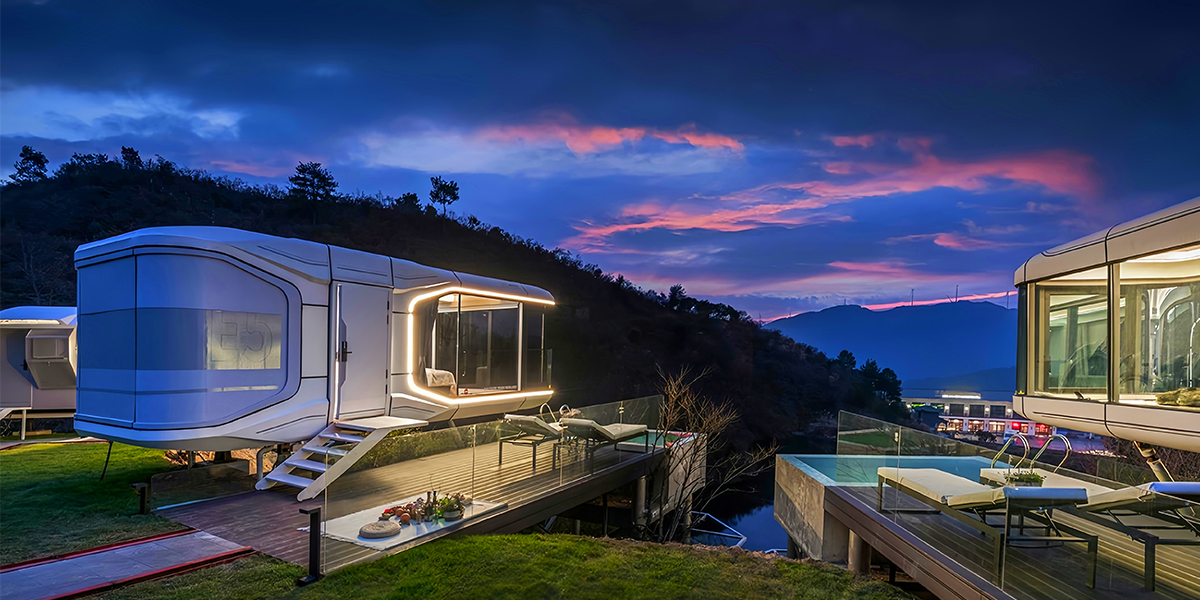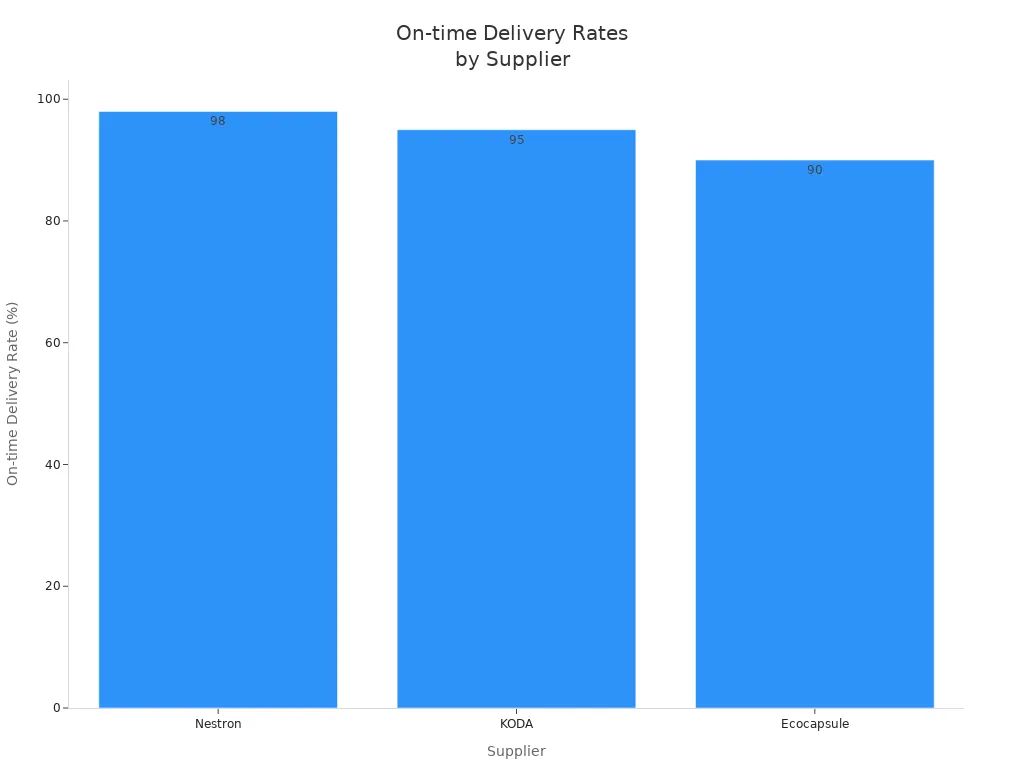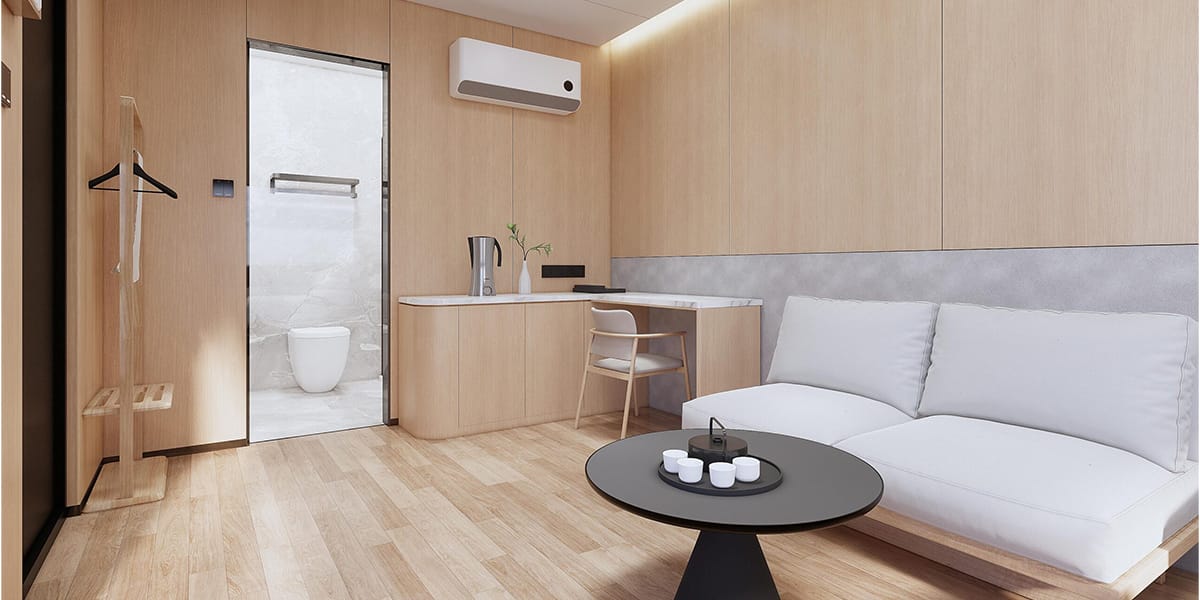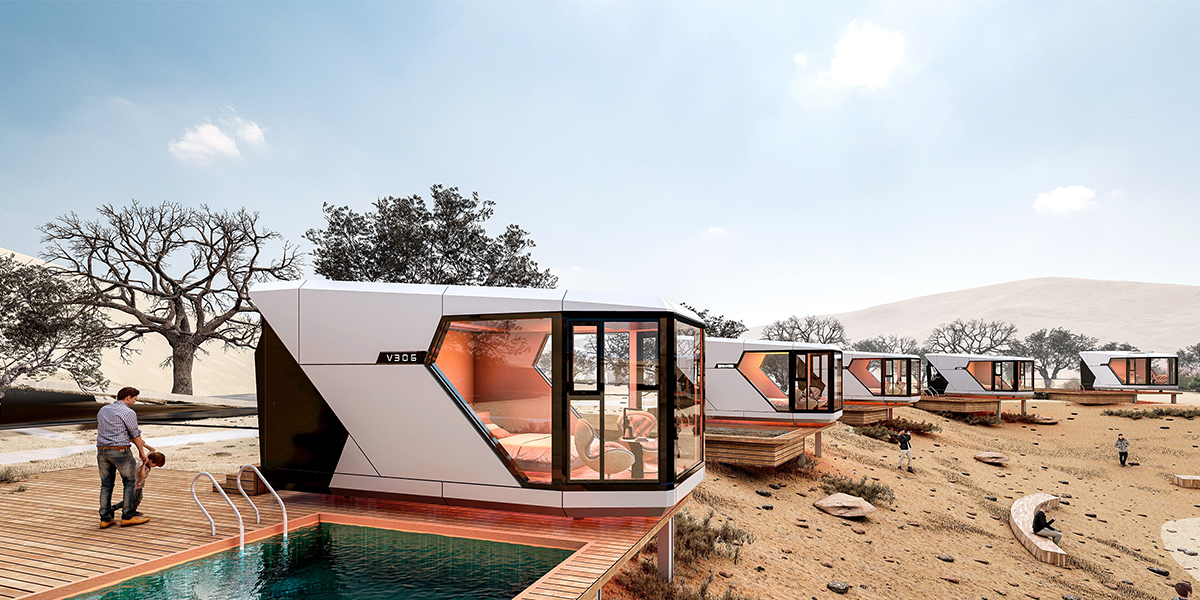
13 Aug Capsule House Modularity and Customization
Table of Contents
Many people want homes that fit their changing lives. Capsule House gives you a flexible way to live. You can change your space as your needs change. In the last five years, more people want capsule houses for many reasons:
Cities are bigger now, and people want homes that cost less and help the planet.
Young adults, students, and city workers pick small homes to save money.
More people work from home and want spaces that change fast.
You can choose layouts, materials, and features to make a space that fits you best.
Key Takeaways
Capsule Houses have a modular design. You can add, remove, or move units easily. This helps your home fit your changing needs.
You can change the inside and outside of your home. There are many choices for materials, smart features, and eco-friendly options.
The building process is quick and efficient. Most of the work is done in a factory. This saves both time and money.
Capsule Houses are simple to install, move, and upgrade. They give you more flexibility than regular homes.
Good aftercare and warranties help keep your home safe and comfortable. They also make sure your home stays up-to-date for many years.
Capsule House Modularity
Modular Design
When you pick a Capsule House, you get modular design benefits. Each unit is its own space. You can use one by itself or link it to others. This setup lets you stack, move, or swap capsules easily. You do not need to change the whole house. You can build or take apart your home fast.
Capsules are made in a factory, so they are strong and the same.
You save time and money since most work is done before delivery.
Steel frames and aluminum panels are light, so setup is simple.
Tip: Modular design lets you move or upgrade your home with less work than a regular house.
Scalability
Capsule House lets you change your space as your needs change. You can add more modules if your family grows. You can take some away if you want less space. The main frame can fit many layouts. You can go from open spaces to private rooms without big changes.
You can add capsules for storage, an office, or a rooftop terrace.
Gaps of 3.5 meters let cranes add or swap units with little trouble.
The system works for both short-term and long-term living.
A project in Auckland used 50 Capsule House units to make a big, flexible living place. This shows that modularity helps you grow or change your home over time. Strong steel frames and tough panels keep your home safe from weather for many years.
Customization Options
 Interior Customization
Interior Customization
You can make the inside of your capsule home fit your style. There are many choices for finishes, appliances, and smart technology. You can pick different floors, cabinets, and lights. The table below lists some favorite options:
Customization Category | Options Available |
|---|---|
Flooring | Advanced waterproof composite wood; Ecological composite flooring |
Cabinetry | Modular cabinet solutions; Custom storage modules |
Lighting | Warm multicolor lighting with smart controls; Sensor lights; Day-night systems |
Additional Interior Features | Electric curtains; Large skylights; Smart control panels; Underfloor heating; Smoke alarm; Starry ceiling |
You can also pick from many sizes and wood colors. Flexible layouts let you use your space as a home, office, gym, or guest room. The steps include a meeting, picking finishes, and seeing 3D pictures before building.
Smart home tech makes life easier. You can control lights, heat, and security from one panel or your phone. Things like electric curtains and AI systems help you save energy. Some models have big glass windows, movie screens, and voice controls. These features fit into the design and make your home modern and cozy.
Note: Capsule House interiors focus on comfort, style, and function. You get more choices than most regular prefabricated homes, which often have fewer options and fixed layouts.
Exterior Features
You can also change the outside of your capsule home. Many people pick features that save energy and look nice. Here are some popular outside options:
Solar roofs for clean energy
Green roofs with plants for insulation and beauty
Energy-saving glass for better light and warmth
Low-energy heating systems
Timber cladding from eco-friendly sources
Energy-saving fixtures and details
Solar shading with cedar louvers for weather protection
You can pick strong materials like aviation-grade aluminum and galvanized steel. Thick insulation helps your home last over 50 years and keeps out bad weather. There are many floor plans, like the U30 and U50, which give about 30 square meters of space. You can choose layouts with living rooms, bedrooms, bathrooms, and kitchens. Murphy beds and open designs help you use all your space.
Tip: Capsule House exteriors use eco-friendly materials and smart design. You get a home that is safe, saves energy, and lasts a long time.
Capsule House lets you design your space more than most regular prefabricated homes. You can pick finishes, smart features, and layouts that fit your life. The process is easy and lets you see your choices before building starts.
Capsule House Process
Picking a Capsule House has a few easy steps. Each step helps you make a home that fits you. You work with experts who help you from start to finish.
Consultation
You begin with a meeting called a consultation. This helps you learn what choices you have. Here is what happens during this step:
You find out about different models. Some are small with one room. Others are bigger with more rooms.
You look at features like foldable furniture and eco-friendly materials. You also decide if you want your home to move or stay in one place.
You check out ways to change the inside. You can pick layouts, materials, finishes, and things like solar panels.
You read reviews and look for certificates to see if the maker is good.
You tell the maker what you need. You say how many units you want and what type.
If you can, you visit the factory. You see the materials and how the homes are made.
You talk often with the maker. This makes sure everyone knows what you want.
Tip: A good meeting helps you know what to expect. You can ask questions and see real samples.
Design Selection
After the meeting, you pick your design. This is when you choose the layout and features you like. You can use a ready-made plan or make your own with a designer. Some people want big open spaces for friends. Others want private rooms for work or sleep. You pick how many rooms you want. You also choose where to put windows, doors, and storage.
Designers listen to your ideas and suggest the best layouts. You can add things like a rooftop terrace or more storage. This step lets you see what your choices will look like.
Materials Choice
Next, you pick the materials for your Capsule House. Good materials make your home strong and safe. Here are some common materials and what they do:
Steel frames make your home strong and flexible. They stand up to wind and earthquakes.
Aluminum panels are light and do not rust. They are easy to care for.
Fiberglass is tough, easy to clean, and does not get moldy.
Composite panels use plastic, wood, and resin. They keep your home warm and strong.
Polyurethane foam gives great insulation. It keeps your home warm in winter and cool in summer.
You can also pick panels that save energy and block noise. Some panels store and release heat to save energy. These materials are safe and good for the planet.
Material | Benefit |
|---|---|
Steel | Strong, flexible, lasts a long time |
Aluminum | Light, does not rust, easy to care for |
Fiberglass | Tough, does not get moldy, easy to clean |
Composite Panels | Warm, strong, keeps out water |
Polyurethane Foam | Great insulation, saves energy |
Note: Picking the right materials helps your home last longer and use less energy.
Visual Approval
The last step before building is seeing what your home will look like. You get to look at 3D pictures or models of your design. This lets you check every part, like the layout, colors, and finishes. You can ask for changes if you do not like something. Seeing your design first helps you feel sure about your choice.
Designers use your ideas to make final changes. You say yes to the design before building starts. This step helps stop mistakes and makes sure you get the home you want.
Remember: Talking clearly with your team at each step helps you get the best home.
Installation and Support
 Manufacturing
Manufacturing
The process starts with fast and careful building. After you order, the factory makes your home in 4 to 6 weeks. Skilled workers use strong machines and good materials. They check quality at every step. Here is what happens:
Experts pick safe and tough materials like steel and fire-safe panels.
Engineers use computers to make sure parts fit right.
Workers check each step to meet safety rules.
The team writes down what materials they use and checks they do.
They test for strength, fire safety, and comfort before shipping.
Tip: Factories use smart tools and strict rules to make sure your home is safe and ready to go.
Delivery
Your home comes to your site with a good plan. The team packs each part with foam, boxes, and covers. They label everything so it is easy to put together. Shipping experts handle all the papers and tracking. When your home gets there, skilled workers use cranes and forklifts to move the modules.
The team checks the ground and gets the base ready.
They put the modules together with special tools and clear steps.
Most homes are ready in 1 to 3 days, much faster than normal homes.
Capsule homes are light and easy to move. You can take them to a new place if you want. This is not like regular modular homes, which are heavy and hard to move.
Aspect | Modular Homes | Capsule Houses |
|---|---|---|
Large prebuilt pieces | Portable, light, easy to relocate | |
Installation | Permanent, needs cranes and foundations | Simple, flexible, quick to install |
Mobility | Not designed to move after setup | Easy to move and set up again |

Aftercare
You get good help after your home is set up. Most companies give a warranty for 1 to 5 years. This covers the building, materials, and smart features. If you need help, customer service answers fast. They help with repairs, upgrades, and questions. Many people say the help is quick and friendly.
On-time delivery rates are high, from 90% to 98%.
You can add new tech or more modules later.
Teams check your home after setup to make sure it works.
Note: Good aftercare means you can enjoy your home and feel safe. You always have help if you need it.
You get lots of good things from modular and customizable homes.
You can choose floor plans, materials, and smart features you like.
Building in a factory is quick and saves money. Using eco-friendly choices is better for the earth.
Smart home systems and flexible layouts make life easier and more comfortable.
If you want to begin, look up trusted suppliers, check prices, and plan your setup.
Doing these things helps you make a home that works for you now and later.
FAQ
How long does a capsule house last?
You can expect your capsule house to last over 50 years. Strong steel frames and weather-resistant panels protect your home. Regular care helps keep it in great shape for many years.
Can I move my capsule house to a new location?
Yes, you can move your capsule house. The design makes it easy to take apart and set up again. You can use cranes or forklifts to move the modules. This gives you flexibility if you need to relocate.
What energy-saving features can I add?
You can add solar panels, thick insulation, and energy-saving glass. Many people choose green roofs or smart thermostats. These features help you save money and protect the environment.
Tip: Ask your supplier about the best options for your climate.
How much can I customize the layout?
You can pick from many floor plans or design your own. You choose the number of rooms, window placement, and special features. The modular system lets you change your space as your needs change.




 Interior Customization
Interior Customization Manufacturing
Manufacturing